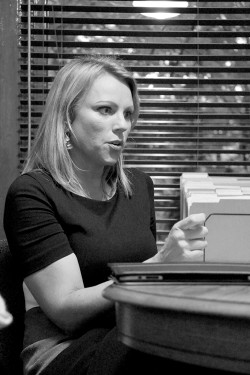For Lara Logan, chief foreign affairs correspondent of CBS news and “60 Minutes” correspondent, survival has always been about certainty in herself, her drive to know more and her passion to report the truth—whether we’re ready to hear it or not.
‘Don’t take no for an answer’
For Lara Logan, chief foreign affairs correspondent of CBS news and “60 Minutes” correspondent, survival has always been about certainty in herself, her drive to know more and her passion to report the truth—whether we’re ready to hear it or not.
“I have always known who I am, what I do. No one has ever done it for me,” Logan said.
Logan spoke at Portland State on Friday as the keynote speaker to mark the beginning of the annual Portland State of Mind weekend. She spoke with 30–40 alumni at the Simon Benson House and later gave a speech at a packed Lincoln Hall.

kayla nguyen/VANGUARD STAFF
Journalist lara logan spent time before her Friday talk with student journalists from the Vanguard.
Logan is an award-winning journalist who has reported from war zones all over the world. In February of 2011, after being arrested and released while reporting on the Egyptian Revolution, Logan was sexually assaulted and beaten by a mob of 200 to 300 men in Tahrir Square.
While the experience was extremely traumatic, Logan never felt the need for justice or revenge, saying she “made a very conscious choice not to be a victim.”
Logan shared advice with aspiring journalists and gave her opinion on the Afghanistan war after years of reporting from the front.
Logan advised showing up at news stations with a pile of work and demanding to be hired. At her first five or six jobs, she convinced employers that they needed her and often offered to work for very little to nothing.
“You don’t just land a job,” she said.
She also had a message to hopeful journalists trying to cover interesting and relevant stories.
“My best advice is don’t take no for an answer. Never let anyone tell you that you can’t do something. Get off your ass and do it.”
Logan’s passion and determination was illustrated during the Sept. 11 attacks when Logan knew she had to get to Afghanistan as soon as possible. But the Russian embassy told her she would have to wait three months for her visa to be approved.
Instead, she took a young male embassy employee out for coffee, exchanged a fake phone number, got the visa and flew out that night.
“You have to do it yourself. You can’t wait for anyone to do it for you,” Logan said.
Logan’s visit to Portland came just more than a week after an Oct. 2 speech in Chicago at the Better Government Association annual luncheon. There, Logan spoke out on the war in Afghanistan saying that after speaking with representatives from all sides of the conflict, the reality of the war does not match the portrayal of the war given by Washington.
Contrary to what the American military has been reporting, the Taliban and al-Qaida are not being weakened but rather are making a come back, she said.
While Logan claims she was trying to bring an honest face to the longest war in American history, critics of Logan have said that she crossed the line from journalism by including too much of her own opinion.
But at PSU, Logan set the record straight. The critics completely missed the point, she said.
“I wasn’t advocating for anything. I wasn’t calling for ramped up war. What I was saying is we need to acknowledge the war that we are in. We need to be honest about the war we are in and what we are doing about it.”
While Washington has depicted the Taliban as an insurgent group trying to overthrow a legitimate government, the reality is far different, she explained.
“They were the government. They are fighting to restore themselves to power,” Logan said.
Logan also believes that the war lacks focus.
“If you are in a war, you need to be in a war. If not, you need to go home. You can’t half-ass it.”
While reporting in Afghanistan, Logan interviewed many different types of people from the common man to the president of Afghanistan to a Taliban commander who specializes in suicide bombing.
Logan said she always focuses on creating the most honest and balanced story possible. The amount of time and detail “60 Minutes” takes to make sure that it is providing factual and important information can be daunting, Logan explained.
“We are trying to do reporting on Afghanistan that means something. We are trying to do reporting on Afghanistan that gives the people the sense of the significance of this on their future,” she said.
Asked if she ever regrets statements she made, Logan said no.
“I stand by everything that I say. I don’t regret anything. I don’t want to be the story, and I think my actions have demonstrated that time and time again.”






I have to politely disagree entirely with the second half of your article, starting with “Lara set the record straight.” I am quite sure that what I’m reading there is *either* her response *during the Q and A* to *MY* question, or are quotes that she gave you directly during a brief interview. I took notes during the talk and wrote in my blog in great detail about what I heard at the talk (published last night, before this article came out). I adore Lara but this is not at all an accurate description of the talk she gave at PSU. Most of the talk was an entertaining series of fascinating anecdotes about her life as a journalist, and most of it did not concern the talk she gave in Chicago or her thoughts on Afghanistan. *Those* thoughts were *only* addressed during the question and answer portion of the evening. You can read my (long-winded!) description of the evening here: laney-lanesworld.blogspot.com.